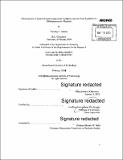Development of Epipolythiodiketopiperazine syntheses and the total synthesis of diketopiperazine alkaloids
Author(s)
Adams, Timothy C. (Timothy Cho)
DownloadFull printable version (13.51Mb)
Other Contributors
Massachusetts Institute of Technology. Department of Chemistry.
Advisor
Mohammad Movassaghi.
Terms of use
Metadata
Show full item recordAbstract
I. The Development of Epipolythiodiketopiperazine (ETP) Syntheses Epipolythiodiketopiperazine (ETP) alkaloids represent a structurally complex and biologically potent class of secondary fungal metabolites and these molecules have been known since the 1930s. The biological activity of these molecules is quite potent and the modes of toxicity possessed by these agents involve the generation of reactive oxygen species (ROS) and direct manipulation of target proteins. The biosynthesis of these compounds has been the subject of active study and we have presented our own hypothesis how theses molecules are synthesized by fungi. Efforts to synthesize these alkaloids have been known since the late 1960 to early 1970s and all have highlighted the need to install the requisite disulfide bridge at a late-stage. The ETP motif is known to be notoriously sensitive as it is reactive towards bases and Lewis acids, and in photochemical and redox reactions. II. Development of ETP Syntheses for the Application of the Total Synthesis of (+)- bionectin A The concise and efficient total synthesis of (+)-bionectin A is described. Our approach to these natural products features a new and scalable method for erythro-[beta]- hydroxytryptophan amino acid synthesis and a new mercaptan reagent for the epipolythiodiketopiperazine (ETP) synthesis that can be unraveled under very mild conditions. The development of this new reagent was accomplished after exploring the acid promoted incorporation of different alkyl thiols into diketopiperazine diol substrates. III. Concise Total Synthesis of (+)-Luteoalbusin A The first total synthesis of (+)-luteoalbusin A is described. Our concise and enantioselective synthesis began from the simple starting materials L-alanine and Ltryptophan. Transformations central to our route include a highly regioselective Friedel- Crafts indolization that can be performed on multi-gram scale, as well as a highly diastereoselective oxidation and thiolation. Moreover, this divergent synthesis features a common aminothioisobutyryl intermediate that can be utilized to construct (+)- luteoalbusin A. The spectral data obtained from the synthetic samples confirmed the assigned structure for this natural product.
Description
Thesis: Ph. D. in Organic Chemistry, Massachusetts Institute of Technology, Department of Chemistry, 2015. Cataloged from PDF version of thesis. Vita. Includes bibliographical references.
Date issued
2015Department
Massachusetts Institute of Technology. Department of ChemistryPublisher
Massachusetts Institute of Technology
Keywords
Chemistry.